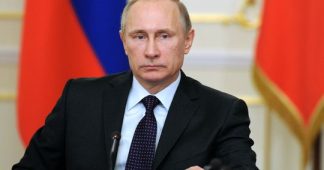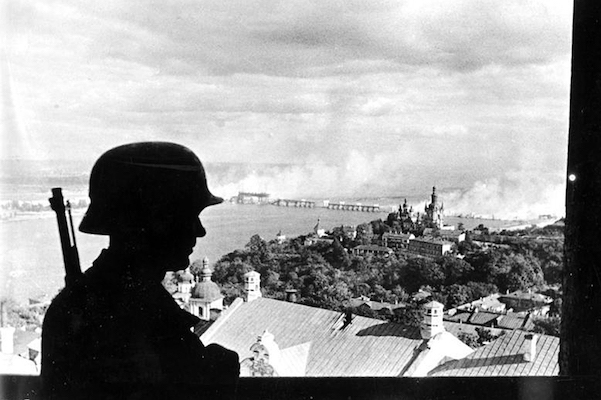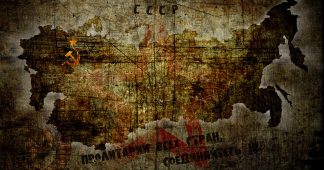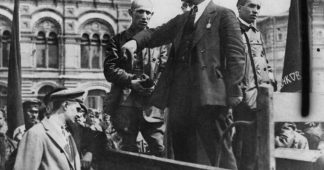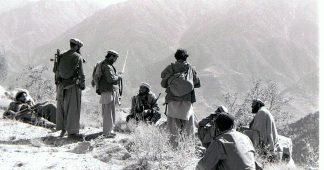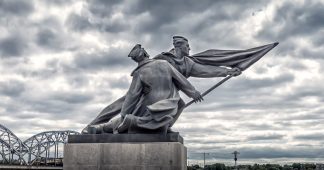By Clara Weiss
11 July 2018
On June 16, Soviet and Russian conductor Gennady Rozhdestvensky died at age 87. Rozhdestvensky had a formative influence on Soviet musical life throughout much of the postwar period. He made a lasting contribution to the popularization of contemporary music, especially the work of his contemporaries, the so called “big three” of the second generation of Soviet avant-garde composers: Alfred Schnittke, Edison Denisov and Sofia Gubaidulina.
Rozhdestvensky was born in 1931 to a family of the Moscow artistic intelligentsia. His mother, Natalya Rozhdestvenskaya, was a well-known soprano who contributed to the popularization of the music of composers Dmitri Shostakovich and Sergei Prokofiev. His father, Nikolai Anosov, was a conductor and taught at the Moscow Conservatory.
Gennady Rozhdestvensky’s youth coincided with the bloodiest, politically most tragic, confusing and traumatizing period in Soviet and Russian history, experiences that could not help but impact his understanding and performance of music. While he was a child, the overwhelming majority of Russia’s leading political and artistic figures were swept up in Stalin’s Great Terror of 1936-1938. Moscow was the center of it all.
According to a dark Soviet joke of the time, the city was like “a bus: everyone’s either sitting or trembling.” Shostakovich, who was based in Leningrad and lived through this period in constant fear for his life, later said he always kept a small suitcase next to the door packed with clothes and other important personal items, in case he were to get picked up by the Soviet secret police, the NKVD.
In 1941, the Soviet Union was invaded by Nazi Germany. The ensuing four-year war, the bloodiest in human history, cost the lives of at least 27 million Soviet citizens, with recent estimates putting the number as high as 40 million. Had Rozhdestvensky been only a few years older, he would likely have been killed in the slaughter, as was much of an entire generation of Soviet male youth born in the early 1920s.
Amidst another wave of purges under Stalin in 1949 that targeted figures like the Polish-Jewish composer Mieczysław Weinberg, a close friend of Shostakovich, Rozhdestvensky entered the Moscow Conservatory. He studied conducting under his father, and fortepiano under the famed Soviet pianist Lev Oborin. In those years, the so-called Zhdanovshchina [the Zhdanov doctrine]—the oppression of independent intellectual and artistic thought on the basis of the 1948 dictum of Andrei Zhdanov, the Soviet official charged with policing art, against “formalistic” music and literature—was at its height.
Rozhdestvensky never spoke much about his personal experiences or political views and came, like most of his generation, to equate Stalinism with socialism and communism. In the 1990s, he only curtly commented, “I lived with communism for more than 50 years, and I have seen around me terrible things. I was not repressed and I was not in the war. I am very lucky not to have been killed.” Like many artists, he developed a mixture of hatred and contempt for the bureaucracy, often expressed in mocking and scathing humor in music, but never understood its counterrevolutionary role in relation to the conquests of the Russian Revolution.
In 1951, Rozhdestvensky gave his debut at the Bolshoi Theater in Moscow and in 1954, one year after Stalin’s death, he finished the Conservatory. In 1957 he became a doctor of music. By that point, the cultural and political climate in the USSR had changed dramatically.
In 1956, Nikita Khrushchev acknowledged certain of Stalin’s crimes in his famous “secret speech,” sending shock waves throughout the Communist movement internationally and the USSR itself. The “thaw” period followed: while working class opposition to the Stalinist regime continued to be suppressed violently, limited political and cultural freedoms were granted and “economic experiments” were conducted, which in many ways foreshadowed the policies of “perestroika” some thirty years later.
The relative artistic freedom granted and the opening up of Soviet cultural and intellectual life to influences from the West, as limited as they were, meant a sharp break from the previous period and generated an outburst of cultural creativity and ferment. The newly won freedoms were arguably more far-reaching in music than in literature, where many works, including the seminal Kolyma Tales by Varlam Shalamov and Vasily Grossman’s Life and Fate, were still suppressed.
In music, the preceding two and a half decades had been marked by the Stalinist regime’s carrot-and-stick approach to the leading talents—many of whom, despite the occasional medals, lived in a state of permanent anxiety about their careers and lives—and a cutting off of Soviet musicians from the musical life in Western Europe and the US. Now, all the avant-garde composers were accepted as members of the Union of Composers, meaning that they had the right to have their works printed and performed—even if sometimes in remote places with little publicity.
Major figures of contemporary musical life in the West, including composers Luciano Berio, Luigi Nono, Benjamin Britten and soloists like pianists Glenn Gould and Claudio Arrau could now come to the USSR and discuss and perform with Soviet musicians.
Rozhdestvensky was a conductor of the Bolshoi Theater from 1951 to 1961, the Symphony Orchestra of All-Union Radio and Television from 1961 to 1974; the principal conductor at the Bolshoi from 1961 to 1970, the BBC Symphony Orchestra from 1978 to 1981, and of the Orchestra of the Soviet Ministry of Culture from 1983 to 1991. He performed with the leading orchestras of the world, among them the Berlin Philharmonic, the London Symphony Orchestra, the Israeli Philharmonic Orchestra and the Royal Concertgebouw Orchestra. Musicians he worked with included Arrau, Yehudi Menuhin, Mstislav Rostropovich, Oleg Kagan, Natalia Gutman and his wife Viktoria Postnikova.
Rozhdestvensky, who had grown up with the music of Shostakovich and Prokofiev, was particularly noted for his interpretations of their works. In 1972, he conducted the first performance of the original version of Shostakovich’s opera The Nose. He recorded all of the latter’s 15 symphonies in the 1980s, and virtually all of Prokofiev’s orchestral works.
Early on in his career, he started conducting works of contemporary composers. In the mid-1950s, having just completed his education at the Conservatory, he conducted the Concerto Grosso of Andrey Volkonsky at the Moscow Conservatory. Volkonsky had been a student of the Romanian composer and pianist Dinu Lipatti in Paris and was to exert a strong influence on the young generation of Soviet composers. In 1964, Rozhdestvensky conducted the premiere of Edison Denisov’s Le Soleil des Incas ( The Sun of the Incas ), a chamber cantata, one of the important works of the Soviet avant garde. Alfred Schnittke noted that Rozhdestvensky must have premiered hundreds of works of Soviet composers.
He also championed innumerable works by Western 20th century composers, including Britten, Arthur Honegger, Charles Ives, William Walton and many more. In the 1980s, Rozhdestvensky produced the first Soviet recording of Anton Bruckner’s complete symphonies, introducing all of them with thoughtful commentaries.
However, with no one did he work as closely as with Alfred Schnittke. Schnittke, born in 1934, was profoundly influenced musically by his time in postwar Vienna in the late 1940s, where his father was working on behalf of the Soviet government. Schnittke and Rozhdestvensky first met in the early 1960s, when Schnittke was composing mostly in the serial style and was under the influence of the Italian composer Luciano Berio. Rozhdestvensky, by then already an established conductor, was instrumental in popularizing Schnittke’s music both in the USSR and abroad, music which, up until the mid- or late 1970s, was officially frowned upon and pushed to the margins.
Schnittke dedicated some 40 works to Rozhdestvensky and acknowledged that the latter had essentially co-authored many of his compositions. He praised Rozhdestvensky for his encyclopedic knowledge and as someone “who saw and listened to the work of music as a whole.”
In a discussion with the Russian musicologist Alexander Ivashkin in 1989, Rozhdestvensky explained that to him both Shostakovich and Schnittke were “chronologists of their time, annalists [someone who records certain historical events or moods] of the intonation of their time, they both use the same [musical] material … in the same manner.” Ivashkin noted that the mood at concerts of Schnittke was similar to that prevailing at concerts of Shostakovich. Indeed, by the 1980s, premieres of Schnittke’s works were highlights of the cultural life in Moscow and Leningrad, much as those of Shostakovich had been a few decades earlier.
Some of Schnittke’s music may not be so appealing to contemporary listeners, but, as Rozhdestvensky recognized, it was an honest and serious document of the moods prevailing within Soviet society at the time: the nervousness and confusion, the impact of the lasting traumatic experiences of the terror and the war, but also the humor, often black, bitter and scathing, that had distinguished Shostakovich’s music.
Schnittke’s compositions, especially during the late 1970s and 1980s, also reflected the composer’s turn toward mysticism and religiosity, a turn substantial sections of the intelligentsia underwent at the time. (Denisov’s final work, in 1992, was The Story of the Life and Death of our Lord Jesus Christ.)
Rozhdestvensky’s approach to music was informed by both the historical experiences he had gone through with his generation, and the profoundly democratic tendencies within the Soviet culture which, despite the USSR’s bureaucratic degeneration, enabled new layers of workers and urbanized peasants to become professional musicians. He introduced many of his recordings, including for television, with lengthy explanations of the historical background, motives and intentions of the music in question.
Rozhdestvensky’s manner of working with orchestras has been described as very unusual. Unlike many other conductors, he preferred to rehearse very little so as not to lose the spontaneity of the moment during the concert and to maintain the possibility of improvisation. In an interview, he said that one must not expect from the rehearsal what one wants to hear at the concert and that he did not want to “kill the concert,” something that, in his opinion, regularly happened through over-rehearsing. He also stated that it would take him only 10 minutes to determine the qualification of an orchestra, what he had to focus on and what he could achieve with it.
This approach has been criticized by some orchestras he worked with, especially after 1991 in the West, and has at times yielded rather mixed results. Yet at his best, and with orchestras he connected with well, Rozhdestvensky was capable of creating unique interpretations, highlighting passages and aspects that made even well-known works such as Antonin Dvorak’s 9th Symphony sound extraordinarily fresh and moving.
In a letter to the Guardian, a musician who had been involved in a 1978 performance of Rozhdestvensky with the BBC Symphony Orchestra, wrote: “At one point Rozhdestvensky stopped conducting, walked to the back of the room and let the orchestra get on with it by itself. It was an absolutely electric moment and I’ve never forgotten it. He had complete trust in his players, understanding that performance is about transcending rehearsal rather than just reproducing it.”
For interested readers, this writer recommends the following recordings of Rozhdestvensky on YouTube:
Symphony No. 9 by Antonin Dvorak
[The video starts with introductory remarks by Rozhdestvensky in Russian, the symphony starts at minute 18]
1985 premiere of Schnittke’s Concerto Grosso No. 2 with Oleg Kagan and Natalia Gutman
Shostakovich’s Cello Concerto No. 1 with Mstislav Rostropovich
